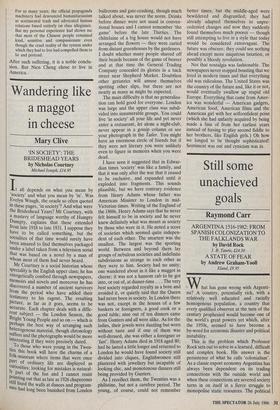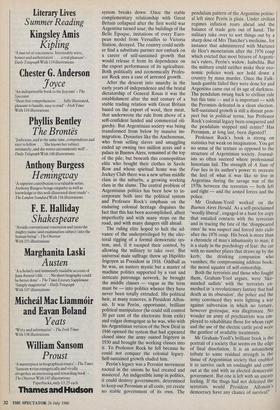Still some unachieved goals
Raymond Carr
ARGENTINA 1516-1982: FROM SPANISH COLONIZATION TO THE FALKLANDS WAR by David Rock
I. B. Tauris, £24.50
A STATE OF FEAR by Andrew Graham-Yooll
Eland, £9.95 hat has gone wrong with Argenti- na? A 'country, potentially rich, with a relatively well educated and racially homogenous population, a country that every qualified observer at the turn of the century prophesied would become one of the world's great powers yet which, after the 1950s, seemed to have become a by-word for economic disaster and political instability.
This is the problem which Professor Rock sets out to solve in a learned, difficult and complex book. His answer is the persistence of what he calls 'colonialism'. As a classic export economy Argentina has always been dependent on its trading connections with the outside world and when these connections are severed society turns in on itself in a fierce struggle to monopolise static resources. The political system breaks down. Once the stable complementary relationship with Great Britain collapsed after the first world war Argentina turned sour; the buildings of the Belle Epoque, imitations of every Euro- pean model from Versailles to Victoria Station, decayed. The country could neith- er find a substitute partner nor embark on a career of self-sustained growth that would release it from its dependence on the export performance of its agriculture. Both politically and economically Profes- sor Rock sees a case of arrested growth.
After the descent into anarchy in the early years of independence and the brutal dictatorship of General Rosas it was the establishment after the mid century of a stable trading relation with Great Britain based on the export of wool, then meat, that underwrote the rule from above of a self-confident landed and commercial oli- garchy. But Argentinian society was being transformed from below by massive im- migration. Dynasties like the Anchonenas, who from selling slaves and smuggling ended up owning two million acres and a palace in Buenos Aires, remained at the top of the pile; but beneath this cosmopolitan elite who bought their clothes in Savile Row and whose spiritual home was the Jockey Club there was a new urban middle class in the suburbs, a growing working class in the slums. The central problem of Argentinian politics has been how to in- corporate both into the political system and Professor Rock's emphasis on the enduring colonial heritage disguises the fact that this has been accomplished, albeit imperfectly and with many stops on the road, and with many dangers still ahead.
The ruling elite hoped to halt the ad- vance of the underprivileged by the elec- toral rigging of a formal democratic sys- tem, and, if it escaped their control, by allowing the military to take over. But universal male suffrage threw up Hipolito Irigoyen as President in 1916. Oddball as he was, an austere mystic but a master of machine politics supported by a vast and intricate patronage network, he brought the middle classes — vague as the term must be — into politics whence they have never been totally extruded. His political heir, at many removes, is President Alfon- sin. It was PerOn, opportunist, brilliant political manipulator (he could still control 30 per cent of the electorate from exile) and vulgar demagogue as he was, who with his Argentinian version of the New Deal in 1946 opened the system that had appeared closed since the army ousted Irigoyen in 1930 and brought the working classes into it. To Professor Rock he fell because he could not conquer the colonial legacy. Self-sustained growth eluded him.
Peron's legacy was a Peronist movement rooted in the unions he had created and mastered. An indigestible lump in politics, it could destroy governments, determined to keep out Peronism at all costs, yet create no stable government of its own. The pendulum pattern of the Argentine politic- al left since Peron is plain. Under civilian regimes inflation roars ahead and the balance of trade gets out of hand. The military take over to sort things out by a sharp dose of Mrs Thatcher's medicine, for instance that administered with Martinez de Hoz's monetarism after the 1976 coup which evicted that most bizarre of Argenti- na's rulers, PerOn's widow, Isabelita. But the military could neither make their eco- nomic policies work nor hold down a country by mass murder. Once the Falk- lands gamble failed they were done for and Argentina came out of its age of darkness. The pendulum swung back to civilian rule but this time — and it is important — with the Peronists defeated in a clean election. Self-sustained growth is still a distant pros- pect but in political terms, has Professor Rock's colonial legacy been conquered and the pendulum stopped mid centre? Has Peronism, at long last, been digested?
Professor Rock's book is strong on statistics but weak on imagination. You get no sense of the texture as opposed to the structure of Argentinian society. Journal- ists so often succeed where professional historians fail. The strength of A State of Fear lies in its author's power to recreate the feel of what it was like to live in Argentina during the savage war of the 1970s between the terrorists — both left and right — and the armed forces and the police.
Mr Graham-Yooll worked on the Buenos Aires Herald. As a self-proclaimed `woolly liberal', engaged in a hunt for copy that entailed contacts with the terrorists and in tracing the fate of the 'disappeared ones' he was suspect and forced into exile after the 1976 coup. His book is more than a chronicle of man's inhumanity to man; it is a study in the psychology of fear: the car with no number plates that draws up by the kerb; the drinking companion who vanishes; the compromising address book; the moral squalor of self-censorship. Both the terrorists and those who fought them, Graham-Yool argues, were 'like- minded sadists' with the terrorists en- meshed in 'a revolutionary fantasy that had death as its obsession', the police and the army convinced they were fighting a war against subversion in which no torture, however grotesque, was illegitimate. No wonder an army of psychiatrists was em- ployed to rehabilitate those for whom rape and the use of the electric cattle prod were the gentlest of available treatments.
Mr Graham-Yooll's brilliant book is the portrait of a society that seems on the edge of final dissolution. It is an astonishing tribute to some residual strength in the tissue of Argentinian society that enabled it to survive such an onslaught and come out at the end with an elected democratic government. But one is left with an uneasy feeling. If the thugs had not defeated the terrorists would President Alfonsin's democracy have any chance of survival?



















































 Previous page
Previous page